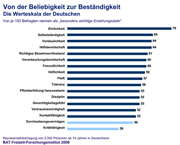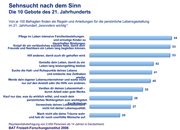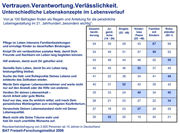BAT Leisure Research Institute publishes future study
Trust. Reliability. Responsibility.
The Germans' new longing for meaning and security.
The much-lamented lamentation about a loss of values and orientation, unstable children and clueless parents will soon come to an end in Germany. German citizens are once again focusing on binding rules of play and behaviour and expect more value-oriented educational goals and commandments. The most important prerequisite for the future viability of our society is the majority of the population's call to "encourage children to form lasting bonds" (54%) and at the same time to provide a "reliable social network" of neighbours and friends (53%). Against the backdrop of growing social problems, just as many German citizens state the following as a necessary rule of life for the future: "Help others so that you too can be helped" (53%). This is the result of a new study by the BAT Leisure Research Institute, which Federal Minister Dr Ursula von der Leyen (CDU) presented today in Berlin together with the Scientific Director of the Institute, Prof Dr Horst W. Opaschowski. 2,000 people aged 14 and over were asked about their educational goals and value orientations. The study "The Moses Principle. The 10 Commandments of the 21st Century" is now available in bookshops (Gütersloher Verlags-haus).
Prosocial values: From arbitrariness to consistency.
Honesty is the most important virtue of Germans
"Instead of insecurity and loss of trust, people are once again looking for meaning and security in life," says Professor Opaschowski. "Prosocial values characterise the image of the future society." Honesty (79%), reliability (64%) and helpfulness (64%) are at the top of the value scale. Conventional values such as politeness (59%) and decency and good behaviour (61%) are also surprisingly popular.
At the bottom of the hierarchy is the ability to take criticism (39%), which still occupied a top position (1982: 74%) in the post-68s period and into the 1980s, threatening to displace so-called "secondary" virtues such as diligence (1982: 51%) and fulfilment of duty (1982: 45%). Today, however, the population believes that values such as diligence (57%), fulfilment of duty (55%) and discipline (55%) are becoming increasingly important again.
"Even for young people, the '68 spontaneity of dancing around their own ego is no longer at the centre of their lives," says Institute Director Opaschowski. "Instead of a decline in values, a new zeitgeist is emerging: self-discipline no longer stands in the way of self-realisation." For the young generation up to the age of 34, the willingness to take responsibility (53%) is even more important than assertiveness (45%). The old German proverb "Youth has no virtue" has outlived its usefulness. On the contrary: young people value and live the virtues of trust (45%), reliability (52%) and responsibility (53%).
At the beginning of the 21st century, traditional values are experiencing a renaissance, but not as a mere retro trend in the sense of a return to the 1950s and 1960s. Opaschowski: "Quite the opposite: the modern concept of life is characterised by a synthesis of values in which apparent opposites are combined." Diligence (57%) and assertiveness (50%) are joined quite naturally by tolerance (56%) and a sense of justice (55%).
Increased security requirements:
Freedom through commitment
At the centre of the change in values today are both compulsory and self-development values, which provide answers to what children really need. It is about the balance in life between support and challenge, helpfulness and self-discipline, a willingness to take responsibility and self-confidence. This value system resembles a successful symbiosis of self-will and public spirit, allows self-development and does not exclude social compatibility, provides sufficient freedom and at the same time takes account of people's increased need for security: from a secure job and training place to a sense of security in the home and neighbourhood to old-age provision and a secure pension.
Even into the 1990s, young people were torn between fleeing from commitment and longing for loyalty, saying goodbye to social obligations and searching for their own life concepts. These tensions and contradictions threatened to throw them off their inner balance, because they pragmatically committed themselves only for a limited time and swore by temporary alliances, as in business life. A lack of commitment went hand in hand with a lack of direction.
Today, clear life plans are once again in demand - albeit with different emphases. For young people, the circle of friends is most important. Singles want to rely more on themselves and become life entrepreneurs. Childless couples tend to focus their life plans on the tension between performance and enjoyment of life. Families rely entirely on the care and intensity of their relationships. And for the older generation, the idea of self-help is most important: "Help others so that you can be helped too."
The longing for intact social relationships ("like in the family") and for stability and security is becoming stronger again. The supposedly golden age of the eighties and nineties, in which egotists believed they could create their own meaning in life between arbitrariness and lack of attachment, is over. Instead of "closeness through distance", it is now more about "freedom through attachment". Only in freedom can bonds and obligations slowly grow and strengthen. The realisation is gaining ground across the board: Family is the most important thing in life. The family is the best life insurance. And: the family remains cheap and merciful throughout life.
However, you don't get that much security and safety in life for free and you can't buy it either. Intact and intensive family relationships must be nurtured and exemplified: "Encourage children to form lasting bonds!" (54%). This is probably the most realistic and at the same time most future-relevant demand of the population today, to give the declared willingness to take responsibility an achievable goal, a direction and a meaning. Parents, grandparents and siblings will have to be the most important mediators of values here.
Living according to the Moses principle:
Overcoming stagnation and phlegm
The Club of Rome first pointed out a dilemma in the 1970s: Many people are extremely irritated and react far too slowly to the waves of social change. Their personal ability to learn can barely keep pace with the rapid pace of technological change - in the world of work as well as in their private lives. As a result, most people are slow to change their everyday habits; indeed, behavioural patterns often only change on a broad scale with a new generation.
In the book "The Moses Principle", the author shows ways of overcoming the stagnation in society and personal phlegm. He calls for pioneering action instead of continuing to remain motionless in a kind of "coma" or just waiting for a "jolt" from above. The "Moses principle" developed by Opaschowski can point the way here. And that means: having an idea, even a vision of the good life - and setting off to get there. Like Moses on his exodus from Egypt, we should not choose the quickest routes and shortest paths, but also take detours. Opaschowski: "Have a clear goal in mind, stay on course and don't shy away from detours in order to really get to where we actually want to go. That was the guiding principle of Moses." If you want a better society, you have to help create a better society.
Outlook: Neither lonely nor unattached.
A new generation of seekers of meaning
The future will increasingly belong to the orientation towards meaning - realised in the formula: From the flight into the senses to the search for meaning. Orientation towards meaning will become the most important resource of the future and a major challenge for the economy. Because with every new consumer offer, the question of meaning "What is it all for?" must be answered at the same time. Professor Opaschowski: "Future markets will always be markets of meaning - in terms of health and nature, culture, education and religion. Ultimately, it's about quality of life. The demand from consumers, who also see themselves as a generation of meaning seekers, is for value messages instead of advertising messages." They want to know little about renouncing consumption, but all the more about the intrinsic value of consumption as part of personal quality of life.
The return of social responsibility, the increased importance of the family, the discovery of friends, neighbours and household communities as social convoys and family-like networks give us hope for the future: Most people will neither be nor want to remain lonely or without ties. And to the same extent that state support systems have to be restricted for demographic and economic reasons, the population's willingness to help and take responsibility is increasing.
Applying the Moses principle as a course book of life means leading the way in future orientation and encouraging others to go their own way and do the right thing. People want to and should help each other more and not simply leave all social problems to the state. People feel that being used is good for their ego. The Moses Principle points the way to a "worthy" future, the values of which must be taken to heart every day: Giving trust, exemplifying reliability and taking responsibility.
The book
HORST W. OPASCHOWSKI: The Moses Principle. The 10 commandments of the 21st century
is available in bookshops: ISBN 3-579-6947-0, Gütersloher Verlagshaus 2006, 14.95 EURO





